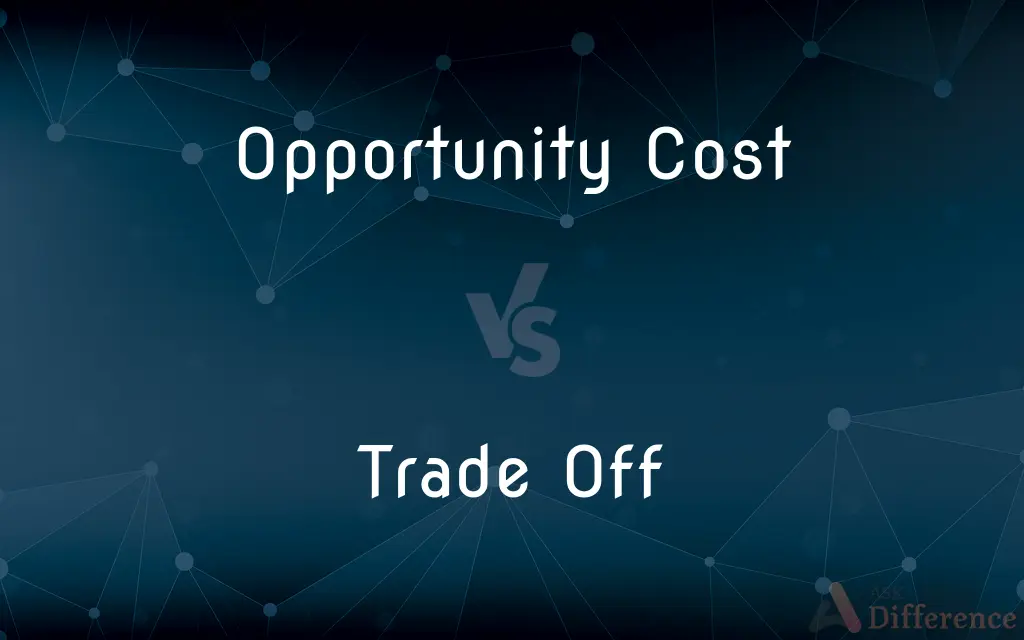Opportunity Cost vs. Trade Off — What's the Difference?
By Tayyaba Rehman — Published on December 31, 2023
Opportunity Cost is the value of the next best alternative forgone. Trade Off is the balancing of factors when making decisions. Both relate to choices but address different aspects of the decision-making process.

Difference Between Opportunity Cost and Trade Off
Table of Contents
ADVERTISEMENT
Key Differences
Opportunity Cost is a key concept in economics that refers to the value of the next best choice or alternative that one gives up when making a decision. For instance, if you decide to spend an evening studying rather than going to a movie, the enjoyment of the movie is the opportunity cost of studying. On the other hand, Trade Off pertains to a situation where to gain some advantage, one must give up another. It's about balancing out factors to come to a decision.
In every decision, there's an Opportunity Cost. It’s the "cost" incurred by not enjoying the benefit associated with the next best choice. For example, if you have $10 and you decide to buy a book instead of a meal, the opportunity cost is the satisfaction and nourishment of the meal you didn't choose. Conversely, Trade Off is the idea that the decision to buy the book over the meal was made after weighing the benefits of both options.
Opportunity Cost is often used to express the potential benefits that could have been received if a different decision was made. It’s not always about monetary value but can also relate to time, pleasure, or any other benefit that provides utility. Trade Off, however, is more about understanding that every choice has pros and cons. In making a choice, one accepts the pros of an option and the cons of not choosing the other options.
Opportunity Cost focuses on the value lost from the second best choice not taken. It's a reflection on what has been foregone. Trade Off, in contrast, underscores the idea of giving something up to gain something else. It is the process of balancing out different factors or options when arriving at a decision.
The essence of both concepts is decision-making. Opportunity Cost is the result of choosing one option over another, and Trade Off is the process leading up to that choice.
ADVERTISEMENT
Comparison Chart
Definition
Value of the next best alternative forgone.
Balancing of factors or options when making decisions.
Focus
What is lost by not choosing the next best option.
Weighing pros and cons of various options.
Relation
Result of a decision.
Process of decision-making.
Measurement
Often quantified in terms of time, money, or other resources.
Describes the balance achieved between factors.
Context
Commonly used in economics to discuss lost potentials.
Widely used in various fields to describe compromises made.
Compare with Definitions
Opportunity Cost
What you give up to get something else.
The opportunity cost of going to college is the income you could've earned working.
Trade Off
A balance between two opposing factors or choices.
The trade off of buying a fast car might be its high fuel consumption.
Opportunity Cost
The loss of potential gain from other alternatives when one alternative is chosen.
Choosing a job in city A means the opportunity cost is the potential better job in city B.
Trade Off
Giving up one thing for the sake of another.
The trade off for living in the city center is often higher rent costs.
Opportunity Cost
The benefits missed when selecting one possibility over another.
The opportunity cost of spending money on luxury goods is the potential savings and its future value.
Trade Off
The process of weighing the pros and cons of different alternatives.
The trade off in choosing a job might involve weighing salary against work-life balance.
Opportunity Cost
The value of the best option not selected.
If you invest in stocks instead of bonds, the opportunity cost is the potential returns from bonds.
Trade Off
A situation where having more of one thing potentially results in having less of another.
The trade off of increasing production speed might be a decrease in product quality.
Opportunity Cost
The cost of forgoing the next best alternative.
The opportunity cost of choosing to sleep in is the productive morning hours lost.
Trade Off
A compromise between two desirable but incompatible options.
The trade off between comfort and fashion is often a tricky decision.
Trade Off
An exchange of one thing in return for another, especially relinquishment of one benefit or advantage for another regarded as more desirable
"a fundamental trade-off between capitalist prosperity and economic security" (David A. Stockman).
Trade Off
Any situation in which the quality or quantity of one thing must be decreased for another to be increased.
In writing, there's often a trade-off between being concise and being complete.
Trade Off
An exchange that occurs as a compromise;
I faced a tradeoff between eating and buying my medicine
Common Curiosities
How is Trade Off different from Opportunity Cost?
While Opportunity Cost focuses on the value lost from not choosing the next best option, Trade Off is about weighing the pros and cons of various choices before making a decision.
Is Opportunity Cost always measured in monetary terms?
No, Opportunity Cost can be expressed in terms of time, happiness, resources, or any other measurable benefit.
What is Opportunity Cost?
Opportunity Cost is the value of the next best alternative that you forgo when making a choice.
Can Opportunity Cost be zero?
In theory, if there's no next best alternative or if all alternatives have the same value, the opportunity cost is zero. However, in most real-life situations, there's always some form of opportunity cost.
Why is it important to understand both Opportunity Cost and Trade Off?
Understanding both concepts helps in making more informed, rational, and beneficial decisions in various scenarios.
Is Opportunity Cost only applicable in economics?
No, while commonly used in economics, the concept of opportunity cost applies to any situation where choices are made.
Are all decisions influenced by Trade Offs?
Yes, nearly all decisions involve trade offs as they require weighing benefits against drawbacks to determine the best option.
Can Opportunity Cost change over time?
Yes, as conditions and alternatives change, the opportunity cost related to a decision can also change.
Does every Trade Off lead to an Opportunity Cost?
Yes, every trade off decision results in an opportunity cost, which is the value of the best alternative forgone.
Do Trade Offs always involve sacrifices?
Yes, trade offs inherently involve giving up one thing to gain another.
How does understanding Trade Off help in decision-making?
Recognizing trade offs allows individuals and organizations to make informed choices by understanding the implications and sacrifices of each option.
Is the highest valued alternative always the Opportunity Cost?
Yes, the opportunity cost is always the value of the highest valued alternative not chosen.
Share Your Discovery

Previous Comparison
Cabinet vs. Council of Ministers
Next Comparison
Hair Gel vs. Hair PasteAuthor Spotlight
Written by
Tayyaba RehmanTayyaba Rehman is a distinguished writer, currently serving as a primary contributor to askdifference.com. As a researcher in semantics and etymology, Tayyaba's passion for the complexity of languages and their distinctions has found a perfect home on the platform. Tayyaba delves into the intricacies of language, distinguishing between commonly confused words and phrases, thereby providing clarity for readers worldwide.













































